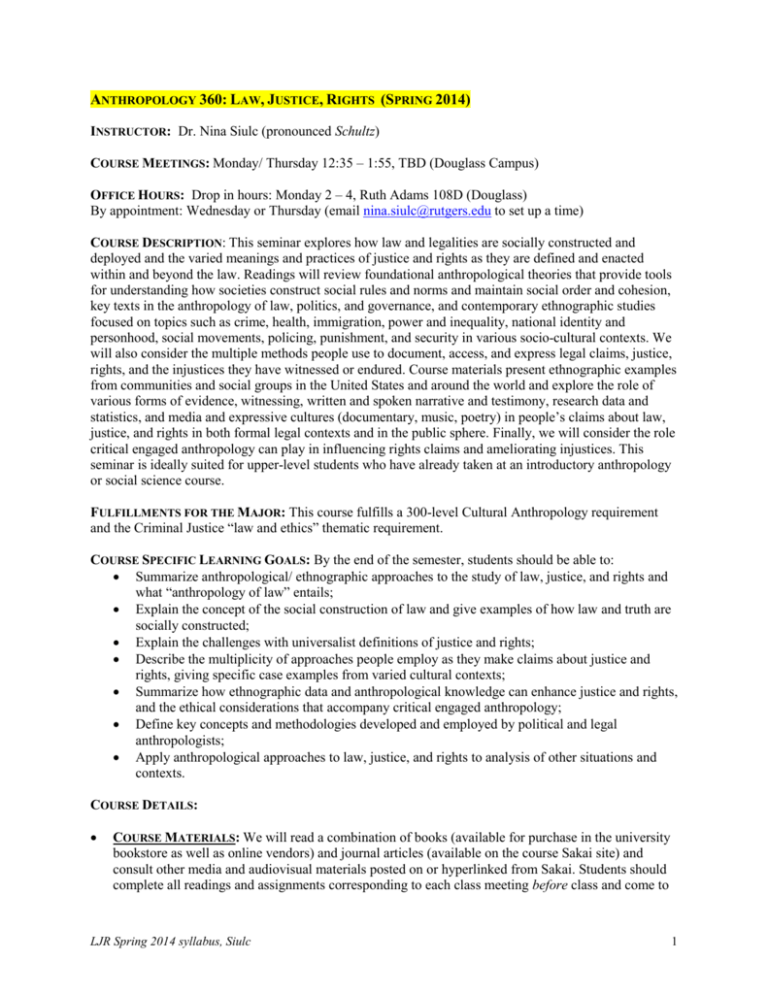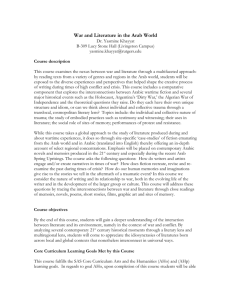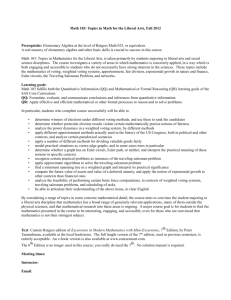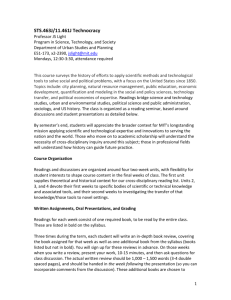070360Syl - Rutgers University
advertisement

ANTHROPOLOGY 360: LAW, JUSTICE, RIGHTS (SPRING 2014) INSTRUCTOR: Dr. Nina Siulc (pronounced Schultz) COURSE MEETINGS: Monday/ Thursday 12:35 – 1:55, TBD (Douglass Campus) OFFICE HOURS: Drop in hours: Monday 2 – 4, Ruth Adams 108D (Douglass) By appointment: Wednesday or Thursday (email nina.siulc@rutgers.edu to set up a time) COURSE DESCRIPTION: This seminar explores how law and legalities are socially constructed and deployed and the varied meanings and practices of justice and rights as they are defined and enacted within and beyond the law. Readings will review foundational anthropological theories that provide tools for understanding how societies construct social rules and norms and maintain social order and cohesion, key texts in the anthropology of law, politics, and governance, and contemporary ethnographic studies focused on topics such as crime, health, immigration, power and inequality, national identity and personhood, social movements, policing, punishment, and security in various socio-cultural contexts. We will also consider the multiple methods people use to document, access, and express legal claims, justice, rights, and the injustices they have witnessed or endured. Course materials present ethnographic examples from communities and social groups in the United States and around the world and explore the role of various forms of evidence, witnessing, written and spoken narrative and testimony, research data and statistics, and media and expressive cultures (documentary, music, poetry) in people’s claims about law, justice, and rights in both formal legal contexts and in the public sphere. Finally, we will consider the role critical engaged anthropology can play in influencing rights claims and ameliorating injustices. This seminar is ideally suited for upper-level students who have already taken at an introductory anthropology or social science course. FULFILLMENTS FOR THE MAJOR: This course fulfills a 300-level Cultural Anthropology requirement and the Criminal Justice “law and ethics” thematic requirement. COURSE SPECIFIC LEARNING GOALS: By the end of the semester, students should be able to: Summarize anthropological/ ethnographic approaches to the study of law, justice, and rights and what “anthropology of law” entails; Explain the concept of the social construction of law and give examples of how law and truth are socially constructed; Explain the challenges with universalist definitions of justice and rights; Describe the multiplicity of approaches people employ as they make claims about justice and rights, giving specific case examples from varied cultural contexts; Summarize how ethnographic data and anthropological knowledge can enhance justice and rights, and the ethical considerations that accompany critical engaged anthropology; Define key concepts and methodologies developed and employed by political and legal anthropologists; Apply anthropological approaches to law, justice, and rights to analysis of other situations and contexts. COURSE DETAILS: COURSE MATERIALS: We will read a combination of books (available for purchase in the university bookstore as well as online vendors) and journal articles (available on the course Sakai site) and consult other media and audiovisual materials posted on or hyperlinked from Sakai. Students should complete all readings and assignments corresponding to each class meeting before class and come to LJR Spring 2014 syllabus, Siulc 1 class prepared to participate and engage with the materials and assigned discussion questions. Students can expect to spend approximately $50 on new course materials (including books for sale in the university bookstore and paper for printing), or less if purchasing used or electronic books from other retailers. We will read two required books in their entirety: o Vine, David. 2011 [2009] Island of Shame: The Secret History of the U.S. Military Base on Diego Garcia. Princeton University Press. Paperback ISBN: 978-0691149837. o Ewick, Patrica, and Susan S. Silbey. 1998. The Common Place of Law: Stories from Everyday Life. University of Chicago Press. Paperback ISBM: 978-0226227443. ATTENDANCE AND ACTIVE PARTICIPATION: Students are expected to attend all classes and actively participate in class discussions. If you expect to miss one or two classes, please use the University absence reporting website (https://sims.rutgers.edu/ssra/) to indicate the date and reason for your absence. Please note: Entering information about an absence into the reporting website does not grant you an automatic waiver to make up missed assignments. It is your responsibility to find out what you missed in class, including announcements about assignments. There will be no make up quizzes or exams, or late assignments accepted unless you have an approved, excused absence for a legitimate reason. If you think you qualify for an excused absence because of a religious holiday, sports event, or medical or other emergency, please contact the professor directly at nina.siulc@rutgers.edu. With the exception of certain emergency situations, there will be no make up tests or late assignments accepted if you notify the professor after the due date has passed. Please consult the university’s absence policy at: http://sasundergrad.rutgers.edu/academics/courses/registration-and-coursepolicies/attendance-and-cancellation-of-class. Students who miss more than 1/3 of the class meetings will automatically fail the course even if they complete all assignments. Note: Students are encouraged to use technology to enhance their learning experience but will be marked absent if they use cell phones, tablets, or laptops for purposes other than taking class notes. COURSE COMMUNICATIONS Course updates will be posted on Sakai. Students must have active email accounts and check their email or Sakai for periodic communications. During inclement weather or other emergencies, please check both the class Sakai page and the Rutgers website. To communicate with the professor, send an email to nina.siulc@rutgers.edu. You will get a response within 24 hours Monday through Friday. If you need to speak by phone, please email to arrange a phone call. Note: emails about assignments and tests may not be answered within 24 hours of the due date. ASSIGNMENTS: are designed around course learning goals and draw primarily on class materials and include: four essays, 6 short assignments or quizzes, a final exam prep assignment, and an in-class final exam. Students will submit all written assignments electronically to the Turnitin portal on Sakai. Late assignments will be strictly penalized. CITATIONS: In text and bibliographic citations should follow the style guide of the American Anthropological Association (http://www.aaanet.org/publications/style_guide.pdf). When the AAA style guide does not provide adequate guidance, refer to the Chicago Manual of Style, 16th edition, available in the university libaries. See the last page of this syllabus for additional formatting guidelines that must be followed for papers. ACADEMIC INTEGRITY is strictly governed by the university’s Academic Integrity Policy, which prohibits cheating, fabrication, plagiarism, denying others access to information or materials, and LJR Spring 2014 syllabus, Siulc 2 facilitating dishonesty and violations of academic integrity. Students should familiarize themselves with the university’s standards and should speak with a faculty member if they have concerns about integrity or questions about proper citation. See: http://academicintegrity.rutgers.edu/. Students are encouraged to take a tutorial on plagiarism and academic integrity and to consult the library’s tip sheet on how to take notes to avoid accidental plagiarism. When in doubt, cite! o Tutorial: http://www.scc.rutgers.edu/douglass/sal/plagiarism/intro.html o Tip sheet: http://www.libraries.rutgers.edu/rul/lib_instruct/instruct_document.shtml GRADING: Students will be graded on a scale of 100 points, according to the following scheme: o Four 3- to 4-page essays: 15 points each (points are awarded for style, clarity, and content), for a total of 60 points; o Five short assignments/ quizzes: 5 points each, for a total of 25 points; o Final exam review assignment: 5 points o Final exam (short answers and short essays): 20 points Points will correspond to letter grades in the following way: A 100—90; B+ 89—86; B 85—80; C+ 79—76; C 75—70; D 69—60; F 59 and below. Students who miss more than 1/3 of class sessions will automatically fail the class. ACCOMMODATIONS: Students who require accommodations should provide appropriate documentation from the Office of Disability Services in Lucy Stone Hall on the Livingston Campus (http://disabilityservices.rutgers.edu/request.html). Disability services can also be contacted by email at dsoffice@rci.rutgers.edu or by phone at (848) 445-6800. Please provide documentation in advance of the first assignment or quiz. COURSE OUTLINE WEEK 1: INTRODUCTION TO THE COURSE CONTENT AND CONCEPTS THURSDAY 1/23 Objectives: discussion of class goals and expectations, introduction to key concepts. Do after class: o Students should log onto Sakai and ensure they can access the class website and know where to find the readings. Students who do not have access to Sakai should check in with the registrar and/or find a friend in class to provide them with readings. WEEK 2: HOW ANTHROPOLOGISTS STUDY LAW MONDAY 1/27 Objectives: Today’s reading reviews how anthropologists approach the study of law, and introduces key terms used by anthropologists studying the relationship between law and culture. A supplemental reading reviews how legal systems are organized in the United States, which may be useful as we begin to read about legal systems elsewhere. Read on Sakai before class: o Excerpts from Bracey, Dorothy H. 2006. Exploring Law and Culture. Waveland Press. Pages 1-11, 13-27. o Merry, Sally Engle. 1992. Anthropology, Law and Transnational Processes. Annual Review of Anthropology 357 -379 o Recommended background: Friedman, Lawrence 2004. Chapter 1: Law in America. Law in LJR Spring 2014 syllabus, Siulc 3 America: A Short History. New York: Random House. THURSDAY 1/30 (5 POINT ASSIGNMENT DUE) Objectives: Students should come to class able to summarize the differences between anthropological and legal approaches according to this week’s readings. Students should practice reading the articles with the general reading questions at the back of the syllabus and should come to class prepared to engage in discussion and to use insights from today’s readings to build on Monday’s discussion. Read on Sakai before class: from a special issue of Kandel, Randy Frances, ed. 1992. Double Vision: Anthropologists at Law. NAPA Bulletin,11:, read Section I: How Lawyers and Anthropologists Think Differently (p 1-28). o Kandel, Randy Frances. Six Differences in Assumptions and Outlook between Anthropologists and Attorneys, p. 1-4. o Rigby, Peter and Peter Sevareid. Lawyers, Anthropologists, and the Knowledge of Facts, p. 5-21. o Davidson, Michael. Law, Science, Causality, and Proof, p. 21-28. WEEK 3: THE SOCIAL CONSTRUCTION OF FACTS MONDAY 2/3 Objectives: today’s readings explore the social construction of truth and the contextual nature of “facts.” Students should come to class able to explain what we mean when we say that facts are socially constructed, to summarize the key points from each reading, and to provide examples from the readings or other contexts of the major points these two authors make. We will discuss these readings in relation to the previous week’s observations about how anthropologists approach the study of law and about how social actors view, construct, and make claims about truth. Read on Sakai before class: o Herzfeld, Michael. 1998. Factual Fissures: Claims and Contexts. Annals of the American Academy of Political and Social Science, Special Edition: The Future of Fact, 560:69-82. o Bruner, Jerome. 1998. What is a Narrative Fact? Annals of the American Academy of Political and Social Science 560:17-27. Additional reading (suggested, not required): This amusing piece explores why we should be skeptical of some scientific studies claiming universal rules and truths: o Henrich, Joseph, Steven J. Heine, and Ara Norenzayan. 2010. The Weirdest People in the World? Behavioral and Brain Sciences 33:61-35. Watch together in class: two clips from the Stephen Colbert show on “truthiness” THURSDAY 2/6 Objectives: Today’s readings explore the social construction of legality and the “commonplace” of law. We begin reading about these concepts in one of our two course books, Ewick and Silbey’s, The Commonplace of Law: Stories from Everyday Life. This book focuses on law in the United States, but we will use the theories they introduce and develop in our analysis of law, justice and rights throughout the semester as we study these themes cross-culturally. Students should take note of key terms introduced here, particularly “legal consciousness” and should be able to explain what we mean by the social construction of legality and the commonplace of law. Read before class: o From Ewick and Silbey: beginning through Chapter 1: Millie Simpson, Chapter 2: The Commonplace of Law, and Chapter 3: The Social Construction of Legality (through page 57). LJR Spring 2014 syllabus, Siulc 4 o Additional background reading on Sakai for interested students: Merry, Sally. 1990. Chapter 3: Legal Consciousness and Types of Problems. Getting Justice and Getting Even: Legal Consciousness among Working-Class Americans. University of Chicago Press. WEEKS 4-5: HOW SOCIAL ACTORS UNDERSTAND LAW, JUSTICE, CITIZENSHIP, AND RIGHTS MONDAY 2/10 (5 POINT ASSIGNMENT DUE) Objectives: This week we will continue reading The Commonplace of Law, focusing on the theoretical framework Ewick and Silbey offer for understanding how social actors understand and interact with formal legal systems. This will help us better understand readings throughout the semester that highlight social actors’ understanding, access to, and performance of ideas about justice and rights. Students should come to class able to explain the concepts of, normativity, impartiality, and textuality and inscription, and should be prepared to engage in a discussion of the meaning of citizenship. Read before class: o Ewick and Silbey: Chapter 4: Before the Law, pp. 57-107. o TBD on “second class citizenship” THURSDAY 2/13 Objectives: Students should be able to explain the difference between Ewick and Silbey’s conceptions of “before” and “with” the law and should come to class today with examples from other contexts that illustrate the idea of “with” the law. Students should take note of the terms introduced in subheadings and should be able to explain the meaning of each. Read before class: o Ewick and Silbey: Chapter 5: With the Law, pp. 108-164. MONDAY 2/17 Objectives: today’s readings build on the theoretical insights in Ewick and Silbey to explore the definitional debates over actions that are both “good” and against the law in some way, drawing on case studies from other regions of the world. Read on Sakai before class: o Coutin, Susan. 1995. Smugglers or Samaritans in Tucson, Arizona: Producing and Contesting Legal Truth. American Ethnologist 22(3): 549-571. o Additional reading TBD from Carolyn Nordstrom THURSDAY 2/20 Read before class: o Ewick and Silbey: Chapter 6: Against the Law, pp. 165-220. ESSAY 1 IS DUE ON THE COURSE SAKAI SITE ON FRIDAY 2/21 AT 5PM WEEK 6: THE ANTHROPOLOGY OF CRIME MONDAY 2/24 Objectives: This week’s readings introduce anthropological approaches to studying crime/ criminalization and social control. Students should come to class able to describe the historical evolution of criminal anthropology and the ways in which anthropologists approach study of crime as a category. Read on Sakai before class: o Rafter, Nicole Hahn. 1992. Criminal Anthropology in the United States. Criminology 30(4): 525-546. LJR Spring 2014 syllabus, Siulc 5 o Nader, Laura. Crime as a Category—Domestic and Globalized. In Crime’s Power: Anthropologists and the Ethnography of Crime. Philip C. Parnell and Stephanie C. Kane, eds. Pp. 55-76. New York: Palgrave. THURSDAY 2/27 (5 POINT ASSIGNMENT DUE) Objectives: Readings for today present contemporary examples of ethnographic research on incarceration and punishment. Students should come to class able to explain what Wacquant means by a “curious eclipse of prison ethnography” and should be able to describe the main arguments in the Rhodes reading. Read on Sakai before class: o TBD selections from Lorna Rhodes and Loc Wacquant on ethnography of prisons WEEKS 7 AND 8: TRANSNATIONAL JUSTICE AND TECHNOLOGIES OF WITNESSING MONDAY 3/3 Objectives: students should be able to explain what role technologies such as video cameras play in witnessing and documenting injustices and in anthropological research on law, justice, and rights; how these technologies have impacted human rights activism; and how human rights activists and anthropologists use technology and media to effectively communicate to their audiences. Read on Sakai before class: o McLagan, Meg. 2006. Introduction: Making Human Rights Claims Public. Technologies of Witnessing: The Visual Culture of Human Rights. American Anthropologist 108: 191-195. o Gregory, Sam. 2006. Transnational Storytelling: Human Rights, WITNESS, and Video Advocacy. American Anthropologist 108: 195-204. Look at before class: Witness website: http://www.witness.org/ THURSDAY 3/6 (ESSAY 1 REVISIONS DUE IN CLASS) Objectives: students should be able to describe the purposes and limitations of truth commissions and “organized truth telling” as well as the meaning and challenges of reconciliation. Students should be able to summarize the features of truth commissions and how decisions are made about whose stories to include, and to explain the role of the state and state actors versus other social actors. Read on Sakai before class: o Stanley, Elizabeth. 2002. “What Next? The Aftermath of Organised Truth Telling.” Race and Class 44(1):1-15. o Greg Grandin. 2005. “The Instruction of Great Catastrophe: Truth Commissions, National History and State Formation in Argentina, Chile and Guatemala.” American Historical Review, 46-67. MONDAY 3/11 Objectives: Students should begin reading Island of Shame. We will discuss the introduction through the end of chapter 2 in class today, and students should come to class able to make links between the themes in the book’s introduction and the topics discussed so far in class. Students will read Chapter 3 on their own this week, and will ideally read it for today, though it is not required. Read before class from Island of Shame: o Introduction, Chapter 1: The Ilois, The Islanders, and Chapter 2: The Base of Empire. Begin reading: Chapter 3: The Strategic Island Concept and Changing of the Imperial Guard. THURSDAY 3/13 TBD LJR Spring 2014 syllabus, Siulc 6 WEEK 9: SPRING BREAK, NO CLASS WEEKS 10 AND 11: SOCIAL SUFFERING, EXCLUSION, AND EXILE MONDAY 3/24 (5 POINT QUIZ IN CLASS) Read over break for discussion on 3/25: o Vine: Chapter 4: Exclusive Control and Chapter 5: Maintaining the Fiction THURSDAY 3/27 Objectives: This week’s readings discuss the various ways social actors experience and respond to suffering. Students should be able to explain the concept of structural violence, multiple definitions of social suffering, and differences between personal and public responses to suffering. These readings should help students link themes from several other readings from throughout the semester. Read on Sakai before class: Several short chapters in A. Kleinman, V. Das, and M. Lock, eds, 2007. Social Suffering. Berkeley and Los Angeles: University of California Press: o Farmer, Paul, “On Suffering and Structural Violence: A View from Below.” o Morris, David B. “About Suffering: Voice, Genre, and Moral Community.” o Schwarcz, Vera “The Pane of Sorrow: Public Uses of Personal Grief in Modern China.” Cohen, Stanley, and Bruna Seu. 2002. “Knowing Enough Not to Feel Too Much,” in M.P. Bradley and P. Petro, eds., Truth Claims: Representation and Human Rights. New Brunswick, NJ: Rutgers University Press MONDAY 3/31 Read before class: o Vine: Chapter 6: Absolutely Must Go, Chapter 7: On the Rack, and Chapter 8: Derasine: The Impoverishment of Expulsion and THURSDAY 4/3 o TBD on deportation, refugees, and exile ESSAY 2 IS DUE ON THE COURSE SAKAI SITE ON FRIDAY 4/5 AT 5PM WEEKS 12 AND 13: PUBLIC CLAIMS OF INJUSTICES AND “VISUAL VOICES” MONDAY 4/7 Read before class: o Vine: Chapter 9: Death and Double Discrimination, Chapter 10: Dying of Sagren, Chapter 11: Daring to Challenge, and Chapter 12: The Right to Return and a Humanpolitik THURSDAY 4/10 Special session: Film screening in class of Justifiable Homicide Objectives: In today’s special session we will watch a documentary film, Justifiable Homicide, that examines the police killing, the concept of “justifiable homicide,” and the ways in which family members fight back when they believe the state has wrongfully murdered their loved ones. Students should come to class having read Chevigny’s explanation of police violence and thinking about the concept of vigilante justice in relation to the move we will watch. Read on Sakai before class: LJR Spring 2014 syllabus, Siulc 7 o o o Chevigny, Paul. 1995. Jamaica. In Edge of the Knife: Police Violence in the Americas. Pp. 203-226. New York: The New Press. TBD on “vigilante justice” Selected newspaper articles on Justifiable Homicide. MONDAY 4/14 (5 POINT ASSINGMENT DUE IN CLASS) Objectives: Today’s readings explore social actor’s use of visual images in public spaces to give “voice” to their claims of injustices and their attempts at accessing citizenship rights. Read on Sakai before class: o Bergman, Marcelo, and Mónica Szurmuk (2001) “Gender, Citizenship, and Social Protest: The New Social Movements in Argentina,” in I. Rodríguez, ed., The Latin American Subaltern Studies Reader. Durham, NC: Duke University Press: Durham, NC o Cardalda Sánchez, Elsa, and Amílcar Tirado Avilés (2001) “Ambiguous Identities! The Affirmation of Puertorriqueñidad in the Community Murals of New York City,” in A. LaóMontes and A. Dávila, eds, Mambo Montage: The Latinization of New York. New York: Columbia University Press Check out online before class: o 80 Beautiful Street Crimes Done by Bansky: http://www.boredpanda.com/80-beautiful-streetcrimes-done-by-banksy/ o http://www.dailymail.co.uk/femail/article-1034538/Graffiti-artist-Banksy-unmasked---publicschoolboy-middle-class-suburbia.html o The Cyber Bench: Documenting NYC Graffiti: http://www.at149st.com/index.html WEEK 14: REGULATING AND COMMODIFYING BODIES AND WHAT IT MEANS TO BE FREE THURSDAY 4/17 Objectives: today’s readings explore different ways in which body parts and bodies are commodified and valued. Students should come to class with other examples that illustrate the theoretical concepts introduced in the readings. Read on Sakai before class: o Scheper-Hughes, Nancy. 2001. Commodity Fetishism in Organs Trafficking. Body and Society 7(2-3):1-8. o Cohen-Lawrence. 2001. The Other Kidney: Biopolitics beyond Recognition. Body and Society 7(23): 9-29. o Ellen Moodie. 2006. Microbus crashes and Coca-Cola cash: The value of death in “free-market” El Salvador. American Ethnologist 33(1). MONDAY 4/21 Objectives: today’s readings introduce Paul Farmer’s concept of “pathologies of power.” Students should come to class able to describe Farmer’s arguments and why he believes healthy bodies are the most important right people need to be granted. Read on Sakai before class: o TBD from Farmer, Paul. Pathologies of Power: Health, Human Rights, and the New War on the Poor. o Selections from Sen, Amartya. 1999. Development as Freedom. New York: Random House. THURSDAY 4/24 Objectives: This week’s readings build on and tie together several readings from throughout the LJR Spring 2014 syllabus, Siulc 8 semester, introducing ways of theorizing state practices of violence and the outcomes they achieve. Read on Sakai before class: o Merry, Sally Engle. 2001. Spatial Governmentality and the New Urban Social Order: Controlling Gender Violence through Law and Spatial Governance. American Anthropologist 103(1): 1-28. o Huggins, Martha K. 2000. State Violence in Brazil: The Professional Morality of Torturers. In Citizens of Fear: Urban Violence in Latin America. Pp. 141-151. Peruse online: o Stories from December 2012 about the widely-publicized gang rape of a woman in India (see the below link for a starting point, then use search engines to find additional readings): http://www.nytimes.com/2012/12/29/world/asia/condition-worsens-for-victim-of-gang-rape-inindia.html ESSAY 3 IS DUE ON THE COURSE SAKAI SITE ON FRIDAY 4/25 AT 5PM WEEK 15: ANTHROPOLOGY IN/ OF PUBLIC POLICY MONDAY 4/28 Objectives: Today’s readings introduce anthropological approaches to studying public policy. Students should come to class able to describe the methodologies anthropologist use for studying public policy. Read on Sakai: o Wedel, et al. 2005. Toward an Anthropology of Public Policy. Annals of the AAPSS (600): 30 -51. o TBD from Winifred Tate THURSDAY 5/1 Objectives: Today’s readings explore the role anthropologists can play in shaping public policy and legal cases. Students should come to class ready to discuss and debate the role these readings map for anthropologists helping to shape public policy and law. Read on Sakai before class: o TBD on “human terrain systems” and anthropologists’ work with the U.S. Army o Selections from a special issue of NAPA Bulletin, Volume 11: Section II: Two Case Studies of Effective Anthropological Experts, and Section III. A Legal Field Guide for the Expert Anthropologist. WEEK 16: END OF THE SEMESTER MONDAY 5/5 (last day of classes) Objectives: Review of course concepts in preparation for final exam; course assessments Do and Due for class: Prepare and hand in 10 review questions and answers that you would like to see on the final exam. We will use these to structure our in-class review for the final exam. ESSAY 4 IS DUE TO SAKAI ON WEDNESDAY 5/7 AT 5PM FINAL EXAM: Date TBD, exam period will last 3 hours. LJR Spring 2014 syllabus, Siulc 9 PAPER PREPARATION GUIDELINES FOR PAPERS (MUST BE FOLLOWED FOR FULL CREDIT) • Use 11- or 12-point font, black ink; • Double space sentences but do not insert additional spaces between paragraphs; indent each paragraph; • Use 1-inch margins on all four sides (note—the default in Microsoft Word is 1.25); • Number all pages; • Use American Anthropological Association style for all in-text and bibliographic citations (http://www.aaanet.org/publications/style_guide.pdf); • When AAA style does not provide adequate guidance consult the Chicago Manual of Style, 16th edition (available in the reference section of most university libraries); • When in doubt about citing, it is better to cite more than less. Remember that paraphrased text often requires a citation, as do any ideas that are not common knowledge or your own (see link to the university’s resources on plagiarism at the front of the syllabus); • Avoid long quotes, but do use block quotes for quoted text that exceeds three lines; • Check spelling and grammar and edit papers for clarity; Note: Students who submit papers that are incomplete, illegible, or containing numerous errors will be asked to re-write the papers before receiving a grade. GRAMMAR AND WRITING STYLE GUIDES Students are strongly encouraged to consult or purchase style guides. Some suggestions include: • Chicago Manual of Style (at the library reference desk, Z253.U69 2003) • A Manual for Writers of Term Papers, Theses, and Dissertations, by Kate Turabian (at the library reference desk, LB2369.T8 2007) • The Elements of Style, by Strunk and White (at the library reference desk, PE1408.S772 2000) • MLA Handbook for Writers of Research Papers, by Joseph Gibaldi (at the library reference desk, LB2369 .G53 2003) • Woe is I: The Grammarphobe’s Guide to Better English in Plain English, by Patricia O’Connor (a good basic grammar book, available at B+N, Amazon, and many other bookstores) • Grammar Girl’s Blog: http://grammar.quickanddirtytips.com/ WRITING AND RESEARCH ASSISTANCE • Writing assistance is available free of charge at the Rutgers Learning Centers: http://lrc.rutgers.edu/index.shtml • Rutgers librarians offer research assistance in person or by phone, email or IM: http://www.libraries.rutgers.edu/rul/ask_a_lib/ask_a_lib.shtml • Students seeking evaluation of a possible disability should contact the Office of Disability Services: http://disabilityservices.rutgers.edu/request.html ADDITIONAL NOTE ON PLAGIARISM Students should be aware that all course assignments will be submitted online and scanned in the Turnitin database, which assesses papers for originality and possible plagiarism. Submitted assignments will be included in the Rutgers dedicated database of assignments at Turnitin and will be used solely for the purpose of checking for possible plagiarism during the grading process during this term and in the future. When students are assigned work that is not submitted online to Turnitin, some students may be required to provide an electronic copy of their assignment to the instructor for submission to Turnittin before receiving grades on assignments that show significant departures in style or possible plagiarism. LJR Spring 2014 syllabus, Siulc 10 READING GUIDE In addition to any specific reading questions assigned each week, students should be able to answer the following general questions about each week’s readings and should come to class prepared to engage with the ideas raised by these general questions. 1. Who is the author? We will refer to readings by the author’s last name in class discussion and written work. Having your syllabus with you at all times will help you keep this information handy. When you take notes, always include the author’s name for your reference. What do you know about the author from the reading? How does this seem to relate to the style and arguments in the reading? 2. What is the title of the reading and what does it mean? You should always come to class able to explain what the title means and what concepts it references. This may require looking up the definition of some words. After having read the piece, why do you think the author chose this title? Does the title adequately reflect the main arguments or key concepts in the piece? 3. What are the main arguments or key points of the reading? You should be able to describe in a few sentences what each reading is about and what the author intended to communicate. Most authors state this explicitly. As you are reading, be on the lookout for statements of the main argument or focus. Use these as a guide to the rest of the reading. 4. What key terms/ concepts or words emerged in the reading? Take notes on any key terms. Are these terms new? Does the definition here differ from other definitions you’ve encountered? What is confusing about these key terms and concepts? 5. What questions or points does the reading raise about the week’s topic? How are the various readings from the week related? What links them? 6. How does the reading connect to themes from other readings and class discussion from other weeks? 7. What examples of the concepts and arguments from the reading can you apply to other contexts? Try to apply the concepts, theories, and arguments to other situations and contexts outside the classroom or from your own experiences, and come to class with examples. 8. What methods or sources support the author’s argument? In other words, how does the author know what she or he knows? Does the reading summarize findings from a research study? Is the study using a particular method the author describes? Or, do the findings come from a legal case or argument? An opinion? What kinds of sources are being referenced? 9. What was unclear to you about the reading? As you are reading keep a list of questions for class discussion. Be sure to read with a dictionary in case you encounter unfamiliar terms. 10. What is your assessment of the reading? Are the arguments convincing? Why or why not? What would you change about the argument? Does it seem current or outdated? Are the arguments particular to the context or specific case described? How or why? Did the reading inspire you? Irritate you? Teach you something new? Come to class ready to engage! LJR Spring 2014 syllabus, Siulc 11








